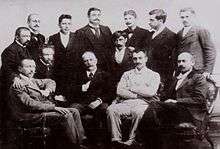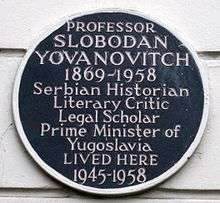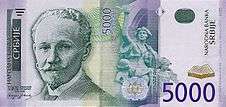Slobodan Jovanović
| Slobodan Jovanović | |
|---|---|
.jpg) Portrait of Slobodan Jovanović by Uroš Predić, 1931 | |
| 15th Prime Minister of Yugoslavia | |
|
In office 11 January 1942 – 26 June 1943 | |
| Preceded by | Dušan Simović |
| Succeeded by | Miloš Trifunović |
| Personal details | |
| Born |
December 3, 1869 Novi Sad, Austria-Hungary |
| Died |
December 12, 1958 (aged 89) London, United Kingdom |
| Nationality | Yugoslavian |
| Occupation | jurist, historian, politician |
Slobodan Jovanović (Serbian Cyrillic: Слободан Јовановић; 3 December 1869 – 12 December 1958) was a Serbian historian, lawyer, literary critic and politician, and one of the most prominent intellectuals of his time. He was the professor at the University of Belgrade Faculty of Law (1897—1940), Rector of the University of Belgrade (1913-14 and 1920-21), and the President of the Serbian Royal Academy (1928–1931). He took part at the Paris Peace Conference (1919) as an expert for the Yugoslav Government.
Jovanović was the Deputy Prime Minister (March 1941 - June 1942) and the Prime Minister of the Royal Yugoslav government-in-exile in London between January 1942 and June 1943. After the World War II, new Communist authorities of Yugoslavia sentenced him in absentia to 20 years in prison. Jovanović remained at liberty for the rest of his life in London.
Biography

Slobodan Jovanović was born in Novi Sad, then part of Austria-Hungary (present-day Serbia) on 3 December 1869 to Vladimir Jovanović and his wife Jelena. He was reportedly the first Serbian male to be named "Slobodan" (sloboda means "freedom" in Serbian), while his sister was named Pravda ("Justice"). He received an excellent education in Belgrade, Munich, Zurich, and Geneva, where he graduated with a law degree. From 1890 to 1892, he took post-graduate studies in constitutional law and political science in Paris before entering the Serbian foreign service. In 1893 he was appointed political attaché with the Serbian mission to Constantinople, where he remained for a couple years. It was at this time that he began to write and have his articles on literary criticism published in various publications throughout the land.
He eventually left the diplomatic service in favour of academia and literary pursuits. In 1897 he was appointed professor at the University of Belgrade's Faculty of Law. For more than four decades, Jovanović taught at the law faculty gaining a reputation as an authority on constitutional law and Serbian language and literature. He was Rector of the University of Belgrade in two separate occasions. Jovanović joined the Serbian Royal Academy in 1908, and was its President from 1928 to 1931. He was also a correspondent member of the Yugoslav Academy of Sciences and Arts in Zagreb from 1927.
Jovanović had some influence on political life in the Kingdom of Yugoslavia due to his well established authority in the field of law and history, but he entered directly political life only in 1939 when the Serbian Cultural Club was established, and he was appointed as Club's president.

He was a pro-Western politician and when a pro-Western military coup took place in Belgrade on 27 March 1941, a pro-Western, essentially pro-British government was installed headed by General Dušan Simović. Jovanović was deputy Prime Minister in that government. The Third Reich attacked the Kingdoms of Yugoslavia and Greece on 6 April, and soon defeated Yugoslav and Greek forces. Jovanović moved in mid April together with King Peter II and other cabinet ministers to Jerusalem and he reached London in July. He became prime minister of the Yugoslav government-in-exile during World War II on 11 January 1942 and remained in that position until 26 June 1943.
Tried in absence in Josip Broz Tito's communist state together with general Draža Mihailović, he was sentenced to 20 years in jail which he never served, as well as the loss of political and civil rights for a period of ten years, and confiscation of all property and loss of citizenship. He spent his later years in exile in London (1945–1958). A memorial plaque in honour of "Professor Slobodan Yovanovitch. Serbian historian, literary critic, legal scholar, Prime Minister of Yugoslavia" may be found in London at 39b Queen's Gate Gardens, Kensington.
After unofficial rehabilitation in 1989, his collected works were published in 1991. In Serbia, he is regarded as one of the most influential political thinkers of the turn of the century. Leading Serbian journal Politika on the occasion of his 70th birthday concluded that "his name has been carved as the highest peak of our culture up to now".[1]
Works

His collected works were published in 17 volumes in 1939–1940. It contains the results of his unremitting labour as a writer, professor and politician for sixty years, and throws considerable light on Balkan history of the first half of the 20th century, as well as on the author himself. Although his works were not officially banned, any new issue of his books was not permitted in communist Yugoslavia until the late 1980s. Finally, a new edition of his collected works was published in Belgrade in 12 volumes in 1991.
Since 2003 his portrait has appeared on the 5000 dinar banknote, and his bust stands at the Faculty of Law in Belgrade. His official rehabilitation occurred on 26 October 2007 by a Belgrade court. Since 10 December 2011, plateau in front of Faculty of Law in Belgrade bears his name.[2]
- O suverenosti, Beograd 1897 [On Sovereignty, Belgrade, 1897].
- O dvodomnom sistemu, Beograd 1899 [On Bicameral System, Belgrade, 1899].
- Velika narodna skupština, Beograd 1900 [Great People's Assembly, Belgrade, 1900].
- Srpsko-bugarski rat. Rasprava iz diplomatske istorije, Beograd 1901 [Serbo-Bulgarian War. A paper in diplomatic history], Belgrade 1901].
- Svetotar Marković, Beograd 1903 [Svetozar Markovic, Belgrade 1903].
- Osnovi pravne teorije o državi, Beograd 1906 [An Introduction to the Legal Theory on State, Belgrade, 1906].
- Osnovi javnog prava Kraljevine Srbije, Beograd 1907–1909 [An Introduction to the Public Law of the Kingdom of Serbia, Belgrade, 1907–1909, in two volumes].
- Makiaveli, Beograd 1907.
- Polititčke i pravne rasprave, Beograd 1908–1910 [Political and Legal Considerations, Belgrade, 1908–1910, in two volumes].
- Ustavobranitelji i njihova vlada, Srpska kraljevska akademija, Beograd 1912 [Constitutionalists and their Government (Belgrade: Serbian Royal Academy, 1912).
- Universitetsko pitanje, Beograd 1914 [University Question, Belgrade, 1914].
- Vođi francuske revolucije, Beograd 1920 [Leaders of the French Revolution, Belgrade, 1920].
- O državi, Beograd 1922 [On State, Belgrade, 1922].
- Druga vlada Miloša i Mihaila, Beograd 1923 [The Second Rule of Milosh and Michael, Belgrade, 1923].
- Ustavno pravo Kraljevine Srba, Hrvata i Slovenaca, Beograd 1924 [Constitutional Law of the Kingdom of Serbs, Croats and Slovenes, Belgrade, 1924].
- Vlada Milana Obrenovića, Geca Kon, Beograd 1926–1927 [The Rule of Milan Obrenovich (Belgrade: Geca Kon, 1926–1927), in two volumes].
- Vlada Aleksandra Obrenovića, Geca Kon, Beograd 1929–1931. [The Rule of Alexander Obrenovich (Belgrade: Geca Kon, 1929–1931, in two volumes].
- Iz istorije političkih doktrina, Beograd 1935 [From the History of Political Doctrines, Belgrade, 1935].
- Gledston, Jugo-istok, Beograd 1938 [Slobodan Jovanovic, Gladstone (Belgrade: Jugo-istok, 1938)].
- Američki federalizam, Beograd 1939 [American Federalism, Belgrade, 1939].
- Primeri političke sociologije, Engleska, Francuska, Nemačka 1815–1914, Beograd 1940 [Examples of Political Sociology: England, France and Germany, 1815–1914, Belgrade, 1940].
- O totalitarizmu, Oslobođenje, Pariz 1952 [On Totalitarianism (Paris: Oslobodjenje, 1952].
- Jedan prilog za proučavanje srpskog nacionalnog karaktera, Vindzor – Kanada 1964 [A Contribution to the Study of the Serbian National Character, Windsor /Canada/, 1964].
- Zapisi o problemima i ljudima, 1941–1944, London 1976 [Notes on Problems and Individuals, 1941–1944, London, 1976)]
Papers in English
- Slobodan Jovanovich, Tito and the Western World (reprinted from The Eastern Quarterly), London, 1952, pg. 6.
- Slobodan Jovanovich, On the New Machiavellism (reprinted from The Eastern Quarterly), London, 1952, pg. 5.
References
- ↑ "Sedamdeset godina zivota gospodina Slobodana Jovanovica" [Seventy years of the life of Mr. Slobodan Jovanovic], Politika, 4 December 1939, p. 9.
- ↑ М. Четник (10 December 2011). "Slobodan Jovanović sahranjen u otadžbini". Politika. Retrieved 20 May 2012.
Sources
- Bataković, Dušan T., ed. (2005). Histoire du peuple serbe. Lausanne: L’Age d’Homme.
- Petrovich, Michael Boro (1984). "Slobodan Jovanović" (PDF). Serbian Studies. NASSS. 3 (1–2).
- Александар Павковић (2008). Слободан Јовановић: један несентименталан приступ политици. Правни факултет Универзитета у Београду. ISBN 978-86-7549-779-0.
- Небојша Поповић (2003). Слободан Јовановић и југословенска држава. Institut za savremenu istoriju.
- Branimir Garić (1993). Слободан Јовановић у емиграцији: разговори и записи. Новинско-издавачка установа Службени лист СРЈ.
- Britannica'
- Dimitrije Djordjevic (1973). «Historians in Politics: Slobodan Jovanovic». Journal of Contemporary History 8 (1): pp. 21–40.
- Milan Milošević (2007-11-01). "Rehabilitacija Slobodana Jovanovića" (in Serbian). Vreme.
Further reading
- Milosavljević Boris (2010). "Liberal and conservative political thought in nineteenth-century Serbia Vladimir Jovanović and Slobodan Jovanović". Balcanica. 41: 131–153.
External links
| Wikimedia Commons has media related to Slobodan Jovanović. |